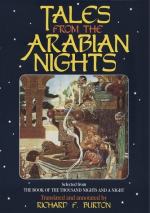[FN#86] The fable is from Al-Kazwini and Ibn Al-Wardi who place the serpent (an animal sacred to AEsculapius, Pliny, xxix. 4) “in the sea of Zanj” (i.e. Zanzibar). In the “garrow hills” of N. Eastern Bengal the skin of the snake Burrawar (?) is held to cure pain. (Asiat. Res. vol. iii.)
[FN#87] For “Emerald,” Hole (p. 177) would read emery or adamantine spar.
[FN#88] Evidently Maharaj=Great Rajah, Rajah in Chief, an Hindu title common to the three potentates before alluded to, the Narsinga, Balhara or Samiry.
[FN#89] This is probably classical. So the page said to Philip of Macedon every morning, “Remember, Philip, thou art mortal”; also the slave in the Roman Triumph,
“Respice poste te: hominem te esse memento!”
And the dying Severus, “Urnlet, soon shalt thou enclose what hardly a whole world could contain.” But the custom may also have been Indian: the contrast of external pomp with the real vanity of human life suggests itself to all.
[FN#90] Arab. “Hut”; a term applied to Jonah’s whale and to monsters of the deep, “Samak” being the common fishes.
[FN#91] Usually a two-bow prayer.
[FN#92] This is the recognised formula of Moslem sales.
[FN#93] Arab. “Walimah”; like our wedding-breakfast but a much more ceremonious and important affair.
[FN#94] i.e. his wife (euphemistically). I remember an Italian lady being much hurt when a Maltese said to her “Mia moglie con rispetto parlando” (my wife, saving your presence). “What,” she cried, “he speaks of his wife as he would of the sweepings!”
[FN#95] The serpent in Arabic is mostly feminine.
[FN#96] i.e. in envying his wealth, with the risk of the evil eye.
[FN#97] I subjoin a translation of the Seventh Voyage from the Calc. Edit. of the two hundred Nights which differs in essential points from the above. All respecting Sindbad the Seaman has an especial interest. In one point this world-famous tale is badly ordered. The most exciting adventures are the earliest and the falling off of the interest has a somewhat depressing effect. The Rukh, the Ogre and the Old Man o’ the Sea should come last.
[FN#98] Arab. “Al-Suways:” this successor of ancient Arsinoe was, according to local tradition, founded by a Santon from Al-Sus in Marocco who called it after his name “Little Sus” (the wormlet).
[FN#99] Arab. “Mann,” a weight varying from two to six pounds: even this common term is not found in the tables of Lane’s Mod. Egyptians, Appendix B. The “Maund” is a well-known Anglo-Indian weight.
[FN#100] This article is not mentioned elsewhere in The Nights.
[FN#101] Apparently a fancy title.
[FN#102] The island is evidently Ceylon, long famed for elephants, and the tree is the well known “Banyan” (Ficus Indica). According to Linschoten and Wolf, the elephants of all lands do reverence and honour to those of Ceylon.




